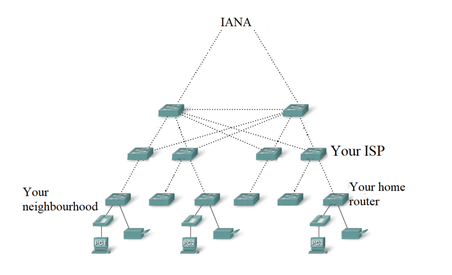The Promise of Internet, Delivered.
p2p.Ninja is a software suite and protocol to form a local computer network in your neighborhood by physically connecting various computers together. In contrast to legacy networking technologies, p2p.Ninja does not require any coordination to assign IP addresses to various computers - each computer can choose an IP address of it's own liking. This, as long as the immediate peers that it connects to do not raise a conflict. The software is designed with ease of use in mind. You can also publish your own website on the network rather easily with the built-in server function.
The benefit of a network based on p2p.Ninja is that new entrants to the network are not required to study the previously formed network and customize it's IP address accordingly. This allows the network to grow organically in a true peer to peer manner. Of course, a challenge that arises here is that there may be more than one computer on the network with the same IP address. And IP addresses cannot be used any more to address data packets.
p2p.Ninja solves these problems by using a public key addressing system to transmit data on it's network. You are therefore freed of asking for a unique IP address from anyone. Public key addressing allows for a large enough address set such that two computers randomly selecting an address are highly likely to choose different addresses for themselves. Also, public keys (by their nature) guard against attempts by malicious servers to spoof another server. Thereafter, each node can directly connect to as many other nodes as needed.
A comparison can be made with what is called 'The onion routing' (TOR) network. TOR network uses cryptographic keys as web addresses. However, the underlying data trafficking is still dependent on IP addresses and TOR is a layer on top of a network with centrally assigned IP addresses. Crudely, p2p.Ninja may be called as a TOR network in your neighborhood. p2p.Ninja does not offer the encryption and anonymity of TOR. But it offers the ability for anyone to join the network and start publishing!
Philosophy: The word 'Internet' derives from 'Interconnected Networks'. It embodies the idea of a technology where any group of people can form a network in their neighborhood, community, school or dorm. And these networks are then free to connect to adjoining networks at multiple nodes to form a leaderless failure-resistant world-wide network.
Unfortunately, what we know as the internet today, sorely lacks the spirit of this word 'Internet'. You can not connect to the Internet by connecting to your neighbors, can you?
Perhaps it would be helpful contrast the meaning of internet with the reality using pictures:
The benefit of a network based on p2p.Ninja is that new entrants to the network are not required to study the previously formed network and customize it's IP address accordingly. This allows the network to grow organically in a true peer to peer manner. Of course, a challenge that arises here is that there may be more than one computer on the network with the same IP address. And IP addresses cannot be used any more to address data packets.
p2p.Ninja solves these problems by using a public key addressing system to transmit data on it's network. You are therefore freed of asking for a unique IP address from anyone. Public key addressing allows for a large enough address set such that two computers randomly selecting an address are highly likely to choose different addresses for themselves. Also, public keys (by their nature) guard against attempts by malicious servers to spoof another server. Thereafter, each node can directly connect to as many other nodes as needed.
A comparison can be made with what is called 'The onion routing' (TOR) network. TOR network uses cryptographic keys as web addresses. However, the underlying data trafficking is still dependent on IP addresses and TOR is a layer on top of a network with centrally assigned IP addresses. Crudely, p2p.Ninja may be called as a TOR network in your neighborhood. p2p.Ninja does not offer the encryption and anonymity of TOR. But it offers the ability for anyone to join the network and start publishing!
Philosophy: The word 'Internet' derives from 'Interconnected Networks'. It embodies the idea of a technology where any group of people can form a network in their neighborhood, community, school or dorm. And these networks are then free to connect to adjoining networks at multiple nodes to form a leaderless failure-resistant world-wide network.
Unfortunately, what we know as the internet today, sorely lacks the spirit of this word 'Internet'. You can not connect to the Internet by connecting to your neighbors, can you?
Perhaps it would be helpful contrast the meaning of internet with the reality using pictures:
As depicted in the figure above (to the right), it is possible for an adverse party to shut down the Internet Service Provider (ISP) in your neighborhood. Under this scenario, you not only loose the ability communicate with an adjoining community, but also the ability to communicate with people in your own community! Also, it is possible that the ISP arbitrarily raises it's price for you and you have no alternative but to engage with the same ISP to join your neighborhood network. There are numerous newsworthy events that prove this point: from tyrannical regimes in foreign countries to ISP oligopolies. Further, you cannot really have peer to peer currency/sharing/communication unless your network is freed from above constraints.
These constraints, at the most basic level, stem from the difficulty of assignment of unique IP addresses. We would obviously like an IP addressing scheme such that we do not have two different servers having the same IP address (including when a malicious server might try to spoof the IP address of another one). But everyone assigning an IP address to themselves is clearly not going to work. This requires an authority (Internet Assigned Numbers Authority, or IANA) to whom all must report to join the internet. Similarly, if you choose to host web content, you must shop around with people who have a right to the limited pool of static IP addresses to host your content. This also precludes 'organic growth' of this network. Because, if you connected your computer to your neighbor's, their is a high likelihood of IP addresses being duplicated - especially as more and more people joined the network.
p2p.Ninja envisions a computer network that is built neighbor to neighbor, block by block and community to community. This totally organic network need not have a central authority to plan network connections, assign addresses or direct routing of traffic. You connect to this network by connecting to you neighbor - and you can connect to as many neighbors as you like! When you would like to host information on this network, there is nowhere to go and ask permission from - you host it on your computer for your neighbors to see and share! This network therefore cannot be shut down by external forces impacting a central point of failure.
Our solution is available to you for download and implementation today to setup a peer to peer scale-able network in your own neighborhood! We are always available to help you in this endeavor.
These constraints, at the most basic level, stem from the difficulty of assignment of unique IP addresses. We would obviously like an IP addressing scheme such that we do not have two different servers having the same IP address (including when a malicious server might try to spoof the IP address of another one). But everyone assigning an IP address to themselves is clearly not going to work. This requires an authority (Internet Assigned Numbers Authority, or IANA) to whom all must report to join the internet. Similarly, if you choose to host web content, you must shop around with people who have a right to the limited pool of static IP addresses to host your content. This also precludes 'organic growth' of this network. Because, if you connected your computer to your neighbor's, their is a high likelihood of IP addresses being duplicated - especially as more and more people joined the network.
p2p.Ninja envisions a computer network that is built neighbor to neighbor, block by block and community to community. This totally organic network need not have a central authority to plan network connections, assign addresses or direct routing of traffic. You connect to this network by connecting to you neighbor - and you can connect to as many neighbors as you like! When you would like to host information on this network, there is nowhere to go and ask permission from - you host it on your computer for your neighbors to see and share! This network therefore cannot be shut down by external forces impacting a central point of failure.
Our solution is available to you for download and implementation today to setup a peer to peer scale-able network in your own neighborhood! We are always available to help you in this endeavor.




